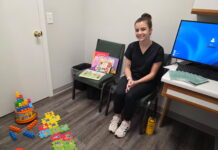
It’s hard to believe summer is over and school is back in session. During the summer months, most children enjoyed staying up later at night and sleeping later in the mornings. Getting your kids back on schedule can be difficult, but a regular bedtime is important for their overall health and well being.
School-aged children should get plenty of sleep. The National Sleep Foundation recommends that children ages 6 to 13 get 9 to 11 hours of sleep per night. Children ages 14 to 17 should get 8 to 10 hours. Young to senior adults should get 7 to 9 hours per night and children under age 6 should get 10 to 13 hours of sleep nightly.
According to Sue Miles, director of the Habersham Medical Center Sleep Disorders Center, “In order for children to do well in school, they must get healthy, consistent sleep. Proper sleep helps them focus, retain information, and manage their emotions much better. ”
She also offers the following tips that are good for children and adults:
- Consistency is key – Stick to a regular bed time. Setting your internal clock helps your body auto-start the sleep process accordingly.
- Bedroom boundaries – Make sure the bedroom is quiet and as dark as possible. Turn all electronic devices off; no watching television or looking at social media on cell phones. This way your body knows that when you get into bed it’s time to go to sleep.
- Work up a sweat – Exercise can give your body something to rest from and help you stay asleep at night. To allow enough wind-down time, it’s best to complete exercise at least two to three hours before going to bed.
- Set the stage – Take a warm shower or bath then get into a cool bed. The drop in your body’s temperature after taking a hot shower and entering a cooler room is a process that naturally mimics day and night, and may help guide people to sleep.
- Put your thoughts to bed – Jot down your to-do list for the next day and keep it near the bed to avoid racing thoughts that can prevent you from falling and staying asleep.
For more information, call the Habersham Medical Center Sleep Disorders Center at (706) 839-7378 or email [email protected].






